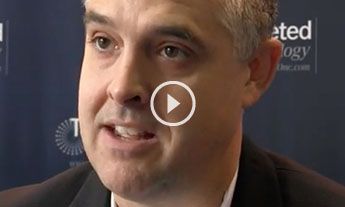Avelumab Shows Efficacy in Ovarian Cancer
The fully human PD-L1 IgG1 antibody, avelumab, demonstrated clinical activity in patients who have previously treated, recurrent/refractory (R/R) ovarian cancer.
Jeffrey R. Infante, MD

Jeffrey R. Infante, MD
The fully human PD-L1 IgG1 antibody, avelumab, demonstrated clinical activity in patients who have previously treated, recurrent/refractory (R/R) ovarian cancer, according to data from a phase Ib open-label expansion trial that was the first and longest study done in ovarian cancer with these types of immunotherapies to date.
“The study began in November 2013 and enrolled 75 patients into an ovarian cohort until November 2014,” said Jeffrey R. Infante, MD, director, Drug Development Program, and principal investigator at Sarah Cannon Research Institute, in an interview withTargeted Oncology.
The study looked at patients with previously treated R/R ovarian cancer. Study investigators examined data after 23 patients made it through 2 months of treatment. Infante thought the responses in ovarian cancer were exciting, because although melanoma and kidney cancer were always thought to be immunogenic, ovarian cancer has typically been more questionable.
The benefit was originally unclear, according to Infante, but the responses were ultimately confirmed and patients did well. “We had some atypical responses where the tumor looked like it was progressing and then, all of a sudden, it started to respond. That was very unique,” said Infante.
Seventy-five percent of patients, 68% of whom received three or more prior therapies, were given treatment with intravenous avelumab at 10 mg/kg biweekly. The objective response rate by RECIST criteria was 10.7% (95% Cl, 4.7-19.9) after a median follow-up duration of 5 months.
Of patients still on the study, 33% were progression-free after 6 months of treatmentone-third of patients continued to benefit after 6 months.
There was a stable disease rate of 44%, and a disease control rate of 54.7%. In addition, the median duration of treatment was 12 weeks, with a median time to response of 9 weeks. The median duration of response was 21 weeks, with 62.5% of responses ongoing.
“From a tolerability standpoint, the PD-L1 inhibitors are, overall, very similar to what has been seen with the PD-1 inhibitors. The majority of these patients do well. There are a small number of patients, around 10% to 15%, who have side effects that are autoimmune-related. These include diarrhea, nausea, and skin rashes, but these are usually manageable,” said Infante. “There are a few patients who have infusion-related reactions, but they [the reactions] are tolerated with antihistamines. The vast majority of patients don’t feel as if they are getting standard chemotherapy. Most of the side effects are grade 1/2 and are manageable and mild. There were no serious adverse events that were thought to be treatment-related in this study.”
Avelumab is also being studied in several tumor types, and other cohorts are already enrolling patients, according to Infante. He hopes to see combination strategies with immunotherapies in the future, in hopes that this will further increase survival. Infante would like to see an increase in PFS by 10% or 15%, with the key being tolerability.
Because of the demonstrated tolerability and durability of avelumab, Infante thinks that as long as avelumab continues to show efficacy in patients with R/R ovarian cancer, it may soon be moved up the sequence of treatment.